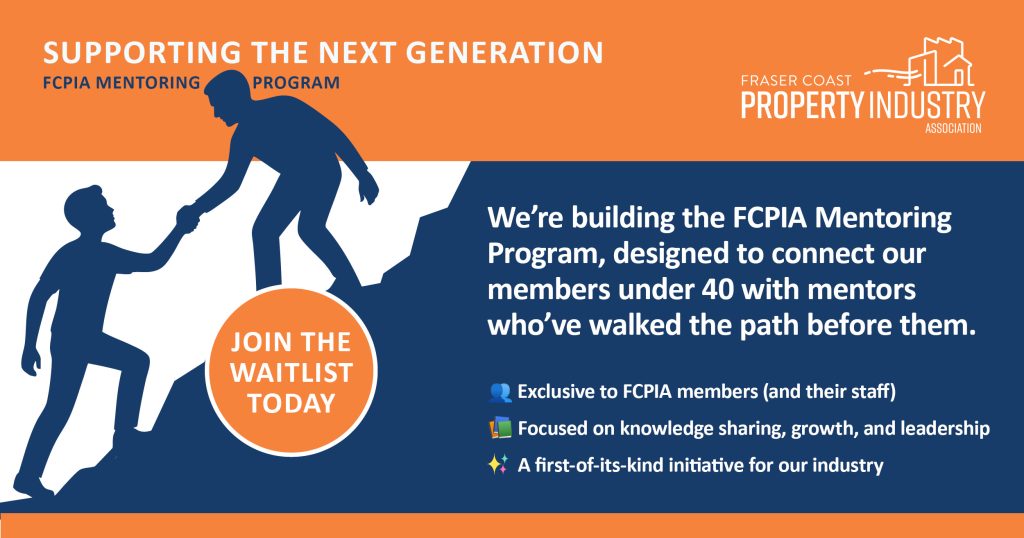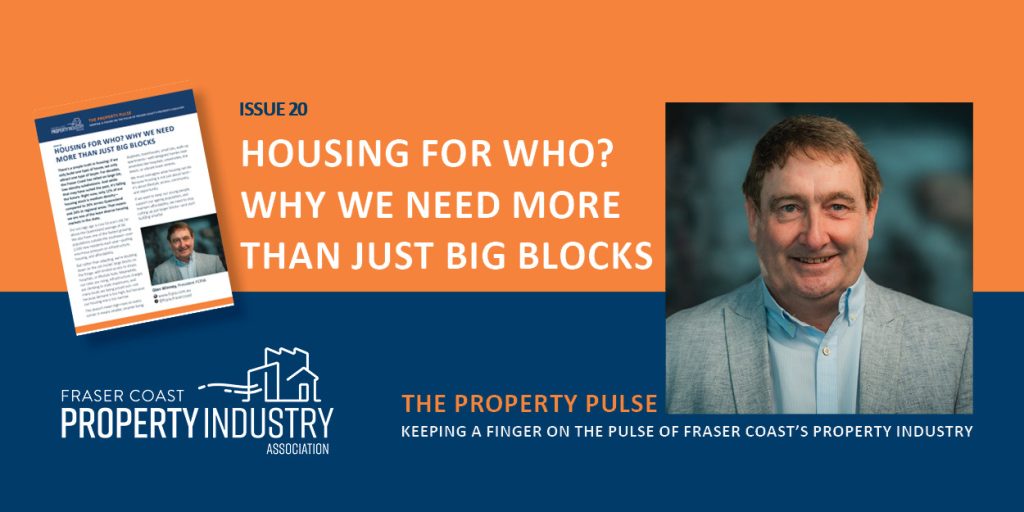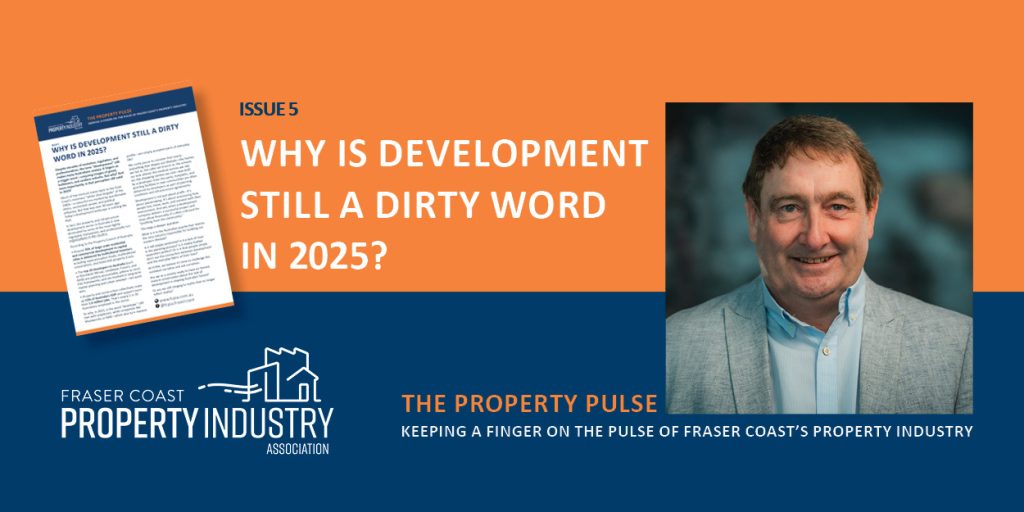Infrastructure charges discount to boost housing diversity
Fraser Coast Regional Counsil MEDIA RELEASE Fraser Coast Regional Council has endorsed new incentives to help boost housing supply and encourage a wider mix of homes across the region. The changes include a 75 per cent discount on infrastructure charges for certain housing types and a separate discount for new residential lots in Maryborough and several nearby towns. “Our region doesn’t just need more houses – it needs more choice,” Development and Planning spokesperson Cr Paul Truscott said. “Smaller homes, units, townhouses, supported accommodation and aged-care style housing all play an important role. “By targeting discounts where they will make the biggest difference, we hope to bring forward more diverse and often more affordable housing options close to jobs, shops and services.” Infrastructure charges are fees paid by developers that help Council fund key services such as roads, water, sewerage, stormwater systems and parks. Under the new Housing Diversity Incentive, eligible townhouses, dual occupancies, community residences, rooming accommodation and residential care facilities in the appropriate residential zones will receive a 75 per cent discount on infrastructure charges. Lifestyle villages and over-50s relocatable home parks are not eligible as Council considers there is already strong supply in that market. As part of the same new package, Council has also adopted a targeted discount to help unlock more housing in Maryborough and several rural and coastal towns. From January 2026, eligible residential subdivisions in these areas will receive an infrastructure charge discount of about 27 per cent. That means a fully serviced lot in Maryborough would attract a charge of approximately $25,000, compared to the current charge of $34,500. “We know there is strong demand for new homes in Maryborough and our rural and coastal towns, but some projects are struggling to stack up financially,” Cr Truscott said. “The tap is flowing in Hervey Bay, but in the southern part of the region, the tap is running dry. “The industry has indicated to Council that the current settings are not working, and these changes are designed to respond to the immediate need for more housing in these areas. “By slightly lowering infrastructure charges in these locations, we’re aiming to tip more projects over the line and get more serviced lots to market.” The discount applies to residential subdivisions in the low density, medium density and rural residential zones in Maryborough and towns such as Tiaro, Howard, Poona and Torbanlea. Cr Truscott said the new incentives would run for two years and be reviewed as part of Council’s Investment Attraction Strategy. “This policy offers targeted discounts while still ensuring growth contributes to the cost of essential infrastructure on the Fraser Coast,” he said. The updated Infrastructure Charges Resolution and Infrastructure Charges Incentives Policy will commence in January 2026 and is proposed to be in place until December 2027, unless replaced by a future investment attraction package.
Mentee Three

Mentee More about Mentee
Mentee Two

Mentee More about Mentee
Mentee One

Mentee More about Mentee
🌟 FCPIA Mentoring Program – Coming Soon

Connecting experience with ambition. The FCPIA Mentoring Program is designed to empower the next generation of property professionals by pairing younger members (under 40) with experienced mentors from within our association. This is about more than advice – it’s about connection, growth, and shaping the future of our industry together. 💡 Why join the waitlist? 🔒 Exclusive to FCPIA members and their employees. Join the waitlist below 👇
Housing for Who? Why We Need More Than Just Big Blocks

There’s a simple truth in housing: if we only build one type of house, we only attract one type of buyer. For decades, the Fraser Coast has relied on large-lot, low-density subdivisions. And while that may have suited the past, it’s failing the future. Right now, only 12% of our housing stock is medium density – compared to 26% across Queensland and 24% in regional areas. That means we are one of the least diverse housing markets in the state. Our average age is now 51 years old, far above the Queensland average of 38. We also have one of the fastest growing populations outside the southeast—over 2,500 new residents each year—putting enormous pressure on infrastructure, housing, and affordability. But rather than adapting, we’re doubling down on the old model: large blocks on the fringe, with limited access to shops, hospitals, or lifestyle hubs. Meanwhile, our rates are rising, infrastructure charges are climbing to state maximums, and many locals are being priced out – not because demand is too high, but because our housing mix is too narrow. This doesn’t mean high-rises on every corner. It means smaller, smarter living: duplexes, townhouses, small lots, walk-up apartments—well-designed homes near amenities like hospitals, universities, the beach, or vibrant town centres. We must reimagine what housing can be. Because housing is not just about land—it’s about lifestyle, access, community, and opportunity. If we want to keep our young people, support our ageing population, and maintain affordability, we need to stop cutting up just larger blocks—and start building smarter.
Why Is Development Still a Dirty Word in 2025?

Despite decades of evolution, regulation, and professionalism, the term “development” still makes many Australians uneasy. It lingers as a trigger word—conjuring images of greed, bulldozers, and soulless suburbs. But why? And more importantly, is that perception still valid in 2025? Much of the mistrust traces back to the Gold Coast’s notorious “white shoe brigade” of the 1980s—a colourful era marked by questionable ethics, unchecked sprawl, and political influence. But that was over 40 years ago. Today’s development landscape is nothing like that. In fact, the property and infrastructure development sector in Australia is now dominated by some of the most tightly regulated, transparent, and professionally run organisations in the country.According to the Property Council of Australia: So why, in 2025, is the word “developer” still met with scepticism, while companies like Woolworths or NAB—which also turn massive profits—are simply accepted parts of everyday life? We rarely pause to consider that nearly everything that shapes our lifestyle—the homes we live in, the cafes we brunch in, the schools our kids attend, the medical centres we rely on, the shopping centres we visit—was built by a developer. Even the parks, footpaths, and sporting facilities in new communities are often delivered by developers as part of planning conditions and infrastructure agreements. Development is not just about profit—it’s about placemaking. It’s about envisioning how people live, move, work, and connect with their environment. And yet, when a development company delivers a successful project and stays afloat financially, it’s often criticised for “profiting from the community.” This begs a deeper question:What is it in the Australian psyche that resents the very industry responsible for building our modern lifestyle?Is it tall poppy syndrome? Is it a lack of trust in the planning process? Is it media-fuelled opposition politics? Or is it that people simply don’t see the connection between development and the everyday fabric of their lives? At FCPIA, we believe it’s time to challenge the outdated narrative and ask ourselves:Are we as a society ready to have an honest, mature conversation about the role of development in shaping Australia’s future? Or are we still clinging to myths that no longer reflect reality?
